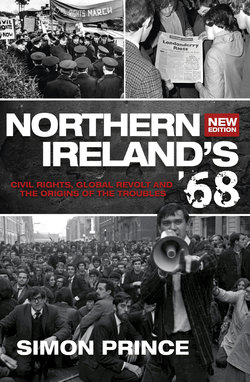Northern Ireland’s ’68

Реклама. ООО «ЛитРес», ИНН: 7719571260.
Оглавление
Simon Prince. Northern Ireland’s ’68
Отрывок из книги
NORTHERN IRELAND’S ’68
Civil Rights, Global Revolt and
.....
The Irish flag was again placed in the window of the Sinn Féin office and was again removed by the Royal Ulster Constabulary (RUC). Barricades were built, petrol bombs were thrown, police Land Rovers were sent in, and water cannons were used.124 O’Neill blamed Paisley for the disturbances and warned against a return to the sectarian violence of the past.125 However, the heightened tensions helped to deliver to the Unionists the marginal Westminster seat for West Belfast. As one Nationalist politician observed, the party leaders believed that they had exploited Paisley for their own ends and, in turn, he was certain that he had used them to score a notable victory.126
The political calculations upon which O’Neill’s triangulation strategy rested were upset by the events of 1966. The fiftieth anniversary of the Easter Rising presented the Unionist government once again with a choice between keeping public order and maintaining party unity. On this occasion, fears that the IRA intended to renew the armed struggle led O’Neill and his ministers to prioritise security over sectarianism. Stormont warned Westminster that the Republicans were planning to provoke sectarian violence and bring the army onto the streets. Harold Wilson was told that the ‘IRA campaign would then be publicised as a people’s uprising against the excesses of the Crown forces’.127 The Northern Ireland government therefore decided – with a few exceptions to appease loyalists – to allow the parades to go ahead and the Irish tricolour to be flown. The Derry Journal praised Stormont’s restraint, which had ‘paid off handsomely in the unruffled peace and calm throughout the community that has prevailed at this commemoration’.128 Although Northern Ireland escaped serious disturbance, the government would have been prepared for it. In the week running up to the anniversary, the press were briefed that ‘police and other security forces have been placed on a footing of instant readiness to meet any unlawful activity which may be mounted by the IRA’.129 The Nationalist Party accused Stormont of indulging in ‘scaremanship of the worst type’. Indeed, O’Neill appears to have hoped that the massive display of state power would placate Protestant extremists. It did not. At a huge Ulster Hall rally, O’Neill was denounced as an ‘arch traitor’.130
.....